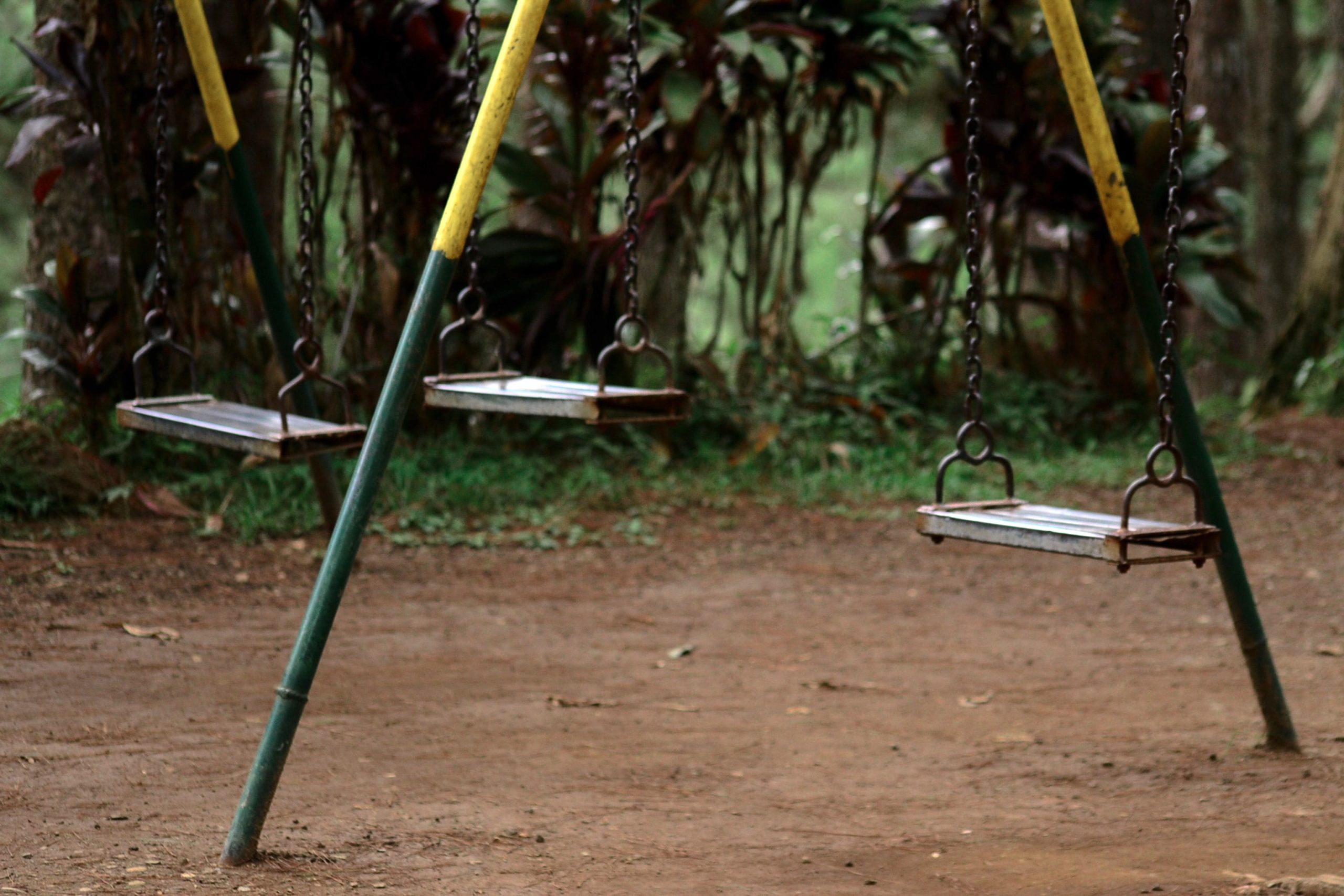essays
Me and You and Law & Order SVU: SIDS and Other Acronyms of Anxiety

by Jaclyn Dwyer

In a C-section, everything happens behind a sterile, blue sheet. I can’t see so I listen to the narrative the nurse anesthetist tells me. She bends down to my face, so close our paper hats are almost touching. Her cheeks are freckled like farm fresh eggs. Her eyes blink through double protection: her dark-rimmed eyeglasses and the flimsy plastic shield between her sterile mask and cap. “She’s a little stuck,” she says. “You’re going to feel some pretty heavy tugging. Just pressure, though, no pain.”
My whole body feels as though it might topple off the operating table and onto the floor. The doctors jerk my belly so hard and sudden, I feel I might burst through the sterile sheet like a marathoner first to the finish.
During my previous C-section, the doctor talked about the sushi he ordered for lunch and going home to his octogenarian mother.
During my previous C-section, the doctor talked about the sushi he ordered for lunch and going home to his octogenarian mother. This time, he talks about the baby, “Try to move the head to the left,” he orders his assistant, “Can you grab the feet over here and push?” They spend long minutes coordinating efforts, as if maneuvering a ship, full sail, out of a bottle.
“I think I’m going to pass out,” I say.
I squeeze my husband’s hand as the anesthetist swivels on her stool to pump me full of more and different drugs.
“She’s out now, honey,” the anesthetist says, but other than the hum of large overhead lights and the steady whir of machines, the room is quiet.
“Why can’t I hear her cry? Is she breathing?”
“She’s still attached to cord,” the anesthetist says. Her voice is calm, matter of fact. My husband releases my hand to peek over the sheet and see what I cannot: a healthy girl, still a part of my body, all mine for a few seconds more before she’s released to the world, shrieking and screaming, and I am reassured.
***
“I want to be a dead body,” I tell my husband early in our relationship when he asks about my hopes and dreams and aspirations. “On Law & Order: SVU.”
“Is that show still on?” he asks.
I have to explain to him that the S in SVU stands for special, not sexual.
At the time, Law & Order: Special Victims Unit is in its thirteenth season. It has just lost Detective Stabler and the show’s future without Benson’s hunky half seems uncertain. The crime drama is like a beloved cat: old enough to pass at any time, but hardy enough to stick around a little while longer.
The crime drama is like a beloved cat: old enough to pass at any time, but hardy enough to stick around a little while longer.
I’m not an actress, though I wanted to be when I was a child. My mother said, “You don’t have the potential,” which I didn’t understand until I auditioned for the school play in eighth grade and found myself choking and shaking, unable to “project myself” the way the director ordered me to.
“Isn’t that a little morbid?” my husband asks.
It didn’t seem morbid at all, being an actress for a day, but without having to act. All I have to do is lie there, perfectly still.
“I can hold my breath for a really long time. I think I’d do a good job.”
The thought of myself spread out in the New York City streets with corn syrup blood on my chest and arms, frozen in place as M.E. Warner zips the black plastic body bag over my face, lured me to websites posting casting calls, even though I lived in Florida, a thousand miles from NYC.
Three years later when I am pregnant with our second child, when it seems like SVU might be on its last season, my husband turns to me and says, “Too bad.”
“Maybe they’ll need a pregnant dead body. You never know.”
“Maybe they’ll need a pregnant dead body. You never know.”
“Wouldn’t it be easier to just put a belly on someone else rather than searching for a pregnant woman?” he asks.
He doesn’t understand what it means to dream.
***
While Eliot Stabler’s home life mirrored a kind of suburban bliss: a Catholic marriage to a stay-at-home wife and mother to five kids, Olivia Benson’s personal life was steeped in trauma that only compounded as the seasons ticked on. Benson was the product of her mother’s rape, a mother who turned to alcohol and eventually died leaving Olivia with no biological family until she discovered a troubled half-brother who shared her rapist father. Benson, who had no children, was married to her job and to her past. Still, Benson yearned for family, the kind of home life she didn’t have, more than a glass of wine and takeout on the couch at the end of the day.
In “Inconceivable,” an episode devoted to fertility and the fate of a stolen tank of frozen embryos, Stabler tells Benson, “You’d make a great mom. Maybe you should think about having kids.” Later in this episode, a woman who faces infertility after cancer treatment asks Benson, “Do you have kids? Don’t you want them? What are you waiting for?”
At the end of the episode, Benson reveals to Stabler that she has tried adopting, but as a single woman working a demanding job Benson was “not prime parent material.”
These questions remain unanswered until the end of the episode, but we the viewers know by the longing look in Benson’s eye, the way she personally delivers the news of this woman that her embryos have not survived, the way she pauses before speaking, that Benson does want them, that she probably has asked herself, “What am I waiting for?” That she, too, fears it may be too late.
***
The summer before ninth grade, my Catholic high school assigns Robin Cook’s Vital Signs as part of a summer reading project. In the novel, a woman seeks treatment at a fertility clinic only to discover that the doctor who was supposed to be helping her conceive has actually sterilized her and other patients, preying upon the desperate and despairing to profit from the many rounds of IVF the women undergo. What I remember most from the novel is the protagonist crouched upon a cold table as the doctor harvests her eggs. Later, she discovers her embryos swimming in a petri dish doused in acid too bright for life. While most teenagers spend dark nights praying for their pregnancy tests to turn up one innocuous line instead of two, I begin saving for the IVF I am certain I’ll one day need.
While most teenagers spend dark nights praying for their pregnancy tests to turn up one innocuous line instead of two, I begin saving for the IVF I am certain I’ll one day need.
I am thirty-one by the time I marry. It took my mother almost two years to conceive me, long enough that she had almost given up.
“Just don’t get pregnant any time soon,” my mother says at my bridal shower. “I want us to take a cruise to Alaska next summer.”
On our honeymoon, my husband downs Bahama Mamas and Mai Tais, while I stick to water and juice, just in case. Two weeks later, I begin pricing Clomid and other fertility drugs after I’ve spent a three-pack of First Response to find I’m not pregnant after all.
“Don’t worry,” my husband says. “It is just one month. My boys can swim.”
“I’m not sure my eggs can float,” I say. I don’t know if the metaphor is right, but it’s all I can think of.
“We can try again when we’re ready,” he says. He is not ready now, but I am convinced my eggs will shrivel up and become raisins. I think about my desiccating ovaries, raisining as we wait. I think about Benson in Season 11’s episode “Ace,” the tragic desperation on her face when she and Stabler go undercover as married candy barons and try to buy the child they can’t have. I convince my husband to try one more time and he does because he knows that look and wants to make me happy.
The following month, I am pregnant.
“I told you my boys can swim,” he says.
After the baby is born, my husband says, “I wish we’d waited.”
He wants to wait before the next one. We wait one year instead of two or three. He’s not sure he wants a third but he knows he does not want a fourth.
“What if something happens to one of them?” I don’t ask.
“I wish we’d waited,” he repeats.
This becomes a kind of chortled mantra that keeps me up at night and makes me want to ask, “Don’t you want them? What are you waiting for?”
***
Benson and Stabler are named after producer Dick Wolf’s children: Eliot and Olivia. I wonder if this is why Stabler is not killed off but instead resigns when he leaves the show, as if writing the death of one Eliot might bring harm to the other.
***
I’m kneeling over my husband, the two of us shoehorned between the crib, the bed, and the closet on the gray fleece blanket I won at his family’s Christmas white elephant when he says, “Baby. Baby.”
I lean into him, my hot breath against his neck.
“Baby. Baby,” he says.
“Baby, Baby,” I parrot but my husband pushes me away.
“No,” he says. “Baby!” He points over my shoulder where our daughter is peeking out over the wall of pillows we’ve stacked to sandbag the mattress as if her sleep is some uncontainable flood and our marriage is an eroding beach.
The following month, we discover we are pregnant again.
“I really want to wait next time,” he says.
I still am not so sure. We need more than the heir and the spare. We need the just-in-case and what-if babies too.
***
When my husband found out we were having a baby, he said, “It’s important to put our marriage first. Don’t let the baby come between us.” But that is exactly where the baby is: between us. Her foot rubs my thigh in rhythmic circles, her soft hand pads the muscled valley of her father’s back as she sleeps, making sure that we’re both bookending her tiny body in the bed. And now there is another on the way. More space. More distance.
***
Benson does adopt. The show gives her a son she finds in a hotel drawer. He, too, is the product of rape. The child opens up a new side of her character and creates the kind of vulnerability that makes for good drama. Someone might kidnap her child (they try). Someone might hurt her child (they do). Her child might get sick (he does). He might stop breathing (he does). The adoption is not final; his father, the courts might try to take him away (they do).
***
My husband is a light sleeper. It took months for him to learn to sleep through the pulsing “chung-chung” as I streamed Law and Order: SVU on my phone into the dark hours of the evening. Sometimes, he stayed up late waiting for me to fall asleep so that he could slumber in silence, but mostly, he wanted to press his warm chest to my back, swing my hair over the pillow and bury his face in my neck. Beside us, Benson and Stabler solved the crimes and caught the bad guys, while Ice-T delivered plucky one-liners.
Unlike true crimes, in Law & Order: SVU, we know who the perpetrators are.
It wasn’t just that I needed TV to fall asleep, I needed that show. I flipped my phone screen down so that only the audio infiltrated the room. There was comfort in familiarity: I’d seen every episode at least once. When I reached the last episode, I’d simply return to the pilot and stream through again. Unlike true crimes, in Law & Order: SVU, we know who the perpetrators are. Even if justice isn’t served in the end, though most of the time it is, we know who to root for and against. The ripped-from-the-headlines plots only made the drama more predictable, and I took solace in that and in the signature chime between scenes. The cadence of a heartbeat echoes into the night: “chung-chung.”
***
Our first daughter will not fall asleep without me. She nurses all night. When she learns to speak, she cries for Mama and signs for milk. Her tiny hands open and close with urgency. Twice I try to wean her and fail. My doctor warns that breastfeeding might induce miscarriage and I vow to stop cold turkey when I discover I am pregnant with our second child. We try to attach the baby to sleep objects. We replace me with a Cabbage Patch Kid and plush-bodied baby with a rattle in her head. Lullaby Elmo, Heartbeat Bear, and a stuffed giraffe join us in bed. The distance between my husband and me grows. My belly grows. Heartbeat Bear is meant to calm a baby by recreating swooshing womb sounds. My daughter is over a year. Does she even remember the sound of the womb? She pushes a heart-shaped button on the bear’s back and the soft metronome of an ultrasound fills the dark room. She pushes the button again, turning the heartbeat on and off until my husband banishes Heartbeat Bear to the back of his closet. We are one less in bed. I cup my hand to my belly and wait to be one more.
***
My parents tell me about my young cousin who, in protest used to hold her breath until she passed out. “It was terrifying,” they said. “Her parents tried everything to get her to breathe, but she was stubborn. They’d have to wait until she fainted. Her parents never got used to it.”
***
Our first daughter only ever slept in our arms. My husband becomes a baby-wearing pro. He straps her tiny body to his chest and stays up all night playing video games online, defending imaginary towers so that I don’t have to worry about SIDS. She breathes skin-to-skin against his chest. After six months of split shift sleeping, when the SIDS risk goes down, we move her into our bed. She latches to sleep and nurses all night curled against me.
Our second daughter turns the crib from hamper to sleep space. I am up all night touching her, startling her through the slats in her crib, running my hands over her sleeper to sense the slight rise and fall of her small belly, listening for the snortles of breastmilk clogged in her nose.
I push the crib against the side of my bed and lay my daughter to sleep on the edge of her mattress. We are inches apart. We are almost touching. My arm bruises from reaching through the rails.
“I’m worried about you,” my husband says, stroking the mottled dots that fan across my skin, an archipelago of anxiety that stretches from elbow to shoulder.
“I’m worried about her,” I say.
***
Another cousin dies of an asthma attack. She is in her car driving when her bronchioles constrict. Her lungs tighten. She reroutes to the hospital, but stops breathing on the side of the road. No one is with her to force their own air into her lungs. When help arrives, it is too late for CPR to save her.
***
Twice our daughter falls out of bed. Both times, I’m not there. My husband is the one to pick her up, check her for bruises and broken bones and watch her eyes for odd dilation. He is the one to sit her on his lap and reassure her that the world is not a terrible place.
Our daughter is Columbus exploring the flat map of our queen size mattress. Both times, my husband tells me, “She was calling your name. She was looking for you.”
***
Instead of nursing my hungry infant at 3 a.m., I hand her over to my husband. “I’m too tired,” I say. My husband takes her crying into his arms, suckling his bicep.
“She wants to nurse,” he says, holding her body out in the dark.
“I just don’t want to,” I whine. “I want sleep.”
But the baby cries, so I nurse her until I’m crying too. When she spits up, instead of changing the sheets, I reach my arm between the crib rails and tug her swaddle to slide her to a drier spot on the mattress. I move her around like a puzzle piece between stains and think I am a terrible mother.
I move her around like a puzzle piece between stains and think I am a terrible mother.
The next time she cries, I queue up Law & Order: SVU to keep me awake. The camera follows Benson home where she hugs her son, feeds him from the Munchkin Stay-Put Bowls. Baby Noah sits in his high chair with the Sassy Wonder Wheel suction cupped to the tray. In another episode, Benson sits on the floor beside a big bag of MegaBlocks. I recognize all of these items from our own living room and think maybe I am doing something right.
***
When Baby Noah stops breathing, Benson is not there. She’s in the kitchen with her co-workers when the nanny rushes in to tell her that her baby’s face is turning blue.
Several times the courts try to take the baby from Benson. You love your job too much, they accuse.
Even your best is never enough.
***
I am a thousand miles away when my father’s heart beats and then doesn’t and he stops breathing. I’m sleeping through the night when a stranger puts his knitted fists to my father’s chest and starts CPR. I don’t hear the rhythmic count of 1-and, 2-and. I’m not there to see the bruises where the stranger beats my father back to life.
***
I Google baby monitors that measure an infant’s heartrate, movement, oxygenation, monitors that sound an alarm when the baby stops breathing, moving. Shrill chirps waken the room if the baby becomes too still to detect. I think about the drive to the OB/GYN a few weeks before our second daughter is born when I don’t feel the baby move all day. How I almost don’t call and when I do I’m surprised at the urgency when the receptionist asks, “How far from the office are you?” How the doctor takes me back right away, pumps me full of Capri Sun, and glides the ultrasound wand over my belly. We watch the baby kick and twist in fuzzy black and white halos on the screen.
How I almost don’t call and when I do I’m surprised at the urgency when the receptionist asks, “How far from the office are you?”
“Her lungs,” he says, pointing to a fluttering black vacuole on the screen. “She’s breathing beautifully,” he says and prints a photo of her bladder for me to take home.
I stare at the image of my unborn daughter, more space than substance. Her body on the screen swirled in white outlines, as if she is a collection of holes, figure eights looped upon themselves several times over.
After, he jokes on the phone to a colleague. “I just saved a baby’s life,” he says. He smirks and winks at me, while I sit on his worn plastic couch and finish my juice like an insolent child sent to the principal’s office for crying wolf.
On the way out, the receptionist reassures me. “You did the right thing. You just never know,” she says.
After the baby is born, I spend weeks researching the monitors. One clips to the diaper, another is sewn into a onesie or fitted into a sock. We purchase the one that slides under the center of the mattress, something innocuous and unseen, and wait to be woken by the high-pitched shriek of distress.
***
In a recent episode of Law and Order: SVU, a crazed nun holds the baby near the window. A concerned Benson has to lure the baby out of her arms. “I need you to put my son down, right now.” Her voice is stern, firm, and followed by action. Once she secures him, Benson softens her tone and says to her son, “Everybody wants to hug you.”
***
The monitor sits in its box on the kitchen counter between the empty napkin holder and a stack of unfinished sewing projects. Maybe I don’t trust the sensor. Maybe the instruction manual is too intimidating. The bruises on my arm turn green, disappear and sprout in new shades of blue and purple, a garden of perennials in cyclic bloom.
My husband doesn’t ask why I’m procrastinating when I’d been so insistent on the purchase. He, too, lets the monitor sit, for days, weeks, months. He pushes the box aside to pay bills or spread mayonnaise on his sandwiches. When the baby is about to turn one month old, he finally asks, “What are you waiting for?” I give him the answer we both know to be true, that it is still too hard to trust that the safest place for the baby is just out of reach.









